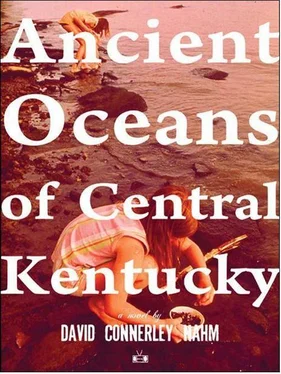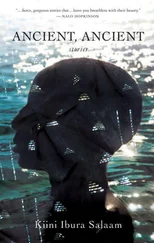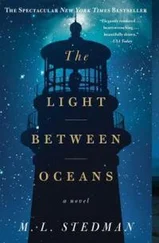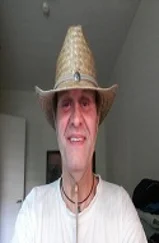MRS. SHEPHERD WENT THROUGH THE HOUSE, tore down the curtains, the dark rooms blasted with morning light, the den floor’s hardwood gleaming in a parallelogram of sun.
A few nights later, Leah woke to the sound of the back door shutting softly. The faintest click of latch. Nothing but a small metal sound. She was awake, perfectly lucid in the shifting, flat darkness of her room. She listened, hoping the sound she heard was something from the other side of sleep. Some strange dream of doors closing.
Then she heard the first footstep. Her skin roared to life. Prickled and goosefleshed. The pits of her knees and elbows bloomed with perspiration. Her neck and cheeks felt as though they’d been ignited.
The footsteps echoed across the hardwood floor downstairs, slowly. A lumbering darkness. As it neared, she felt the pressure in the room rise, as though it was pushing all the air in the house before it, leaving nothing but void and vacuum behind. Then it was on the stairs, the tell-tale squeak of the third. She did not breathe.
And then it was in the hall. It was just outside of her door. She squeezed her eyes shut, she tried to retreat all of her senses into herself as if it would make her invisible to whatever was in the hallway, just behind the door. She could hear it huffing in the hallway and she began to siren and shrill and she emptied her lungs into the dark of the house and all was light and her parents rushed in, her father first, taking her in his arms and their faces blots in the too-bright light. There was nothing there. Gossamer fog filled the empty street. The night had expired.
“Perhaps it would be best if she stayed with your father for the summer,” Mr. Shepherd said.
She knew the man was going to come take her too, and she watched for him everywhere she went, but he never did.
Couldn’t it have been Jacob, coming home? Why hadn’t she thought that? Because she knew it wasn’t. She knew it couldn’t be Jacob, but she could not tell her mother that. They continued to look. They continued to talk to men who took notes and television stations sent smiling women by the house with cameras. For a few weeks at least. She knew and she could not tell her father that she knew. She touched her neck and kept quiet as they looked for her brother.
The red barn’s red paint was peeling off of gray wood. In it lived two brown horses who neighed and rolled their black eyes like black rocks in an eddy. They swished their tails and gnawed yellow grass tossed from above into metal baskets. The tails went back and forth but the horse bots still tumbled in knots of air and their young clung to the dark hide. She pointed at them and was taken outside.
A keep of foxhounds panting and baying. Treading the gray ground to ruts. They poured the clanking kibble into dented metal bowls in the white sun. It was loud.
Her fingers hurt pulling radishes. They didn’t want to come up. In a far corner, under a wide tree on the other side of the fence, a cistern for when the horses were let out. She slapped the surface with her hand. The water was black in the black barrel. The red barn was so far away. Leah thought she’d never make it back. She asked her grandfather if she could go walk down along the stream. Hills, pale yellow with pale grass, swell against afternoon sky and are topped with trees whose bare branches, black against the blue, reach up in rivulets, soil seeping into sky.
Not green bowers so lush they are nearly black with life but the broken body of a bull out beyond the last field. While at work, staring at the empty fields of a spreadsheet, she remembered that summer. A birthmark in the shape of a crab on the side of her neck, a cloud of pigment hidden underneath cascades of crimped hair. In the office bathroom, she sees herself in the mirror after she washes her hands, making sure all is in place and looks at the birthmark. The image in the mirror does not ripple or change like the water barrel. Throughout the day, her hands would flutter to the hair that hung there in that spot and make sure that the dark claws of that unexpected crustacean were obscured. Birds flickered by the window outside. She did not date, though she’d been engaged once. It had not worked out, but it was no tragedy. She hadn’t loved him though she tried.
The summer when she was ten, she watched the bull in the pasture, her grandfather by the blue barrel of rainwater, her face baking in the sun. She wandered his farm, crawling over slumping rock walls and under rusted barbed wire, balancing on logs fallen across shallow streams, slipping into the cool shade of a grove, only to be lured home as the shadows got long by his calling her name to supper.
In the mirror at work, she looked fine. She smiled and shut off the lights and fan as she opened the door. “There was a call for you,” the receptionist said, “but he didn’t leave a message.”
Beyond the trees that lined the stream she found a dead bull upended, neck oblique at roots’ maze. She could not imagine how it got there. The sky turned cloudy and she ran home.
The boys sit in the shade of a weeping willow and try to catch crawdads with their bare hands while a man with a cigarette stands on the bridge watching.
“You ain’t gonna catch shit like that.” He laughs and continues walking. He sits downtown for a while, across from the nonprofit where Leah Shepherd works, hoping to catch sight of her as she comes and goes. He watches the sad-looking women and laughs at their funny walks, laughs at their shrieking children, laughs and coughs. Eventually, he moves on after noticing a middle-aged man in tattered pants staring at him. He walks back by the stream, but the boys are gone. On the cement are the bodies of the crawdads they caught and crushed under their shoes.
Beneath the bushes that lined the fence between the yard and the drive-in, something Leah’s seen on the higher channels when her mother was out of town and her father slept. The wide, green leaves aflame with sunlight. The ground aflame with green sunlight. Later by the stream, a boy from youth group thrust his fist into the cold water and shattered it. The look on his face terrified her.

A group of home-schooled children in the cave. Two girls, one deaf, a young boy with a limp who claps at the bats hanging in bunches from damp stone. A young mother watches them linger along, listening to the young woman in shorts describe how deep in the Earth they are. Leah held her grandfather’s hand as they ducked below cave bacon.
All of God’s trees and grass and sun an eternity above. “These limestone caves prove the Creation Story true. Nothing so vast could have been worn away without the great waves of the Great Flood. Girls? Girls? Listen! Girls!” Her grandfather whispered into her ear: “Bullshit.”
In dripping bone, they are close together. A thin mouth, lit by hidden bulbs. Then the young woman turns the lights out and in the perfect dark, the girls roar into nothing.
The endlessly reeling stars on strips of cinder block, pavement brightly lit on a humid summer night, in flickering light, bodies of flies on a window sill. Leah Shepherd walked across the parking lot in the warm night. The mark was not unusually large or dark or odd. It did not cross her mind, not large or dark or odd in any way, but she kept her hair long, but long hair was the style, long hair dangling about the shoulders. Most meals, she ate at chain restaurants on the bypass. Water rises, water falls, water freezes, water melts. Not large or dark or odd. After she ate, she stopped by the department store to pick up a few things.
The girls in the cars of older boys breezing past her grandfather’s farm. Leah sat on the porch with the old man, in the dark, in the silence, and she enjoyed it. The young people would pass and he would spit into the dark beyond the porch and utter a soft oath. Walking along the sidewalk when she went into town with him, Leah could see the girls’ bare shoulders and she thought of the stillness of the bull. It was dead but seemed to move and she clouded over.
Читать дальше













